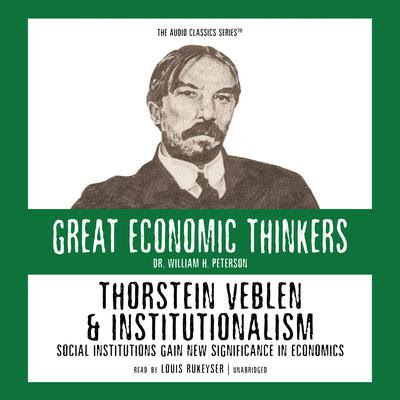So I recently finished listening to an audiobook about the Norwegian-American economist Thorstein Veblen, who lived from 1857 to 1929. It was called “Thorstein Veblen and Institutionalism,” and it may have been as much about his “institutionalist” philosophy as it was about him.
I should note that Veblen was a strong critic of capitalism, and had strong similarities to Karl Marx before him. I obviously didn't agree with much of what he had to say about these issues; but I did nonetheless want to learn about him anyway. I actually tended to agree with their take on him in a number of ways. As it turns out, Veblen himself was very influential on a number of later economists. Among his many disciples was John Kenneth Galbraith, who was also something of a Keynesian. This audiobook covers Galbraith (and some of Veblen's other disciples) in great detail.
John Kenneth Galbraith
But nothing I can say about Veblen would match this extended quote from one of his younger contemporaries – namely, the journalist H. L. Mencken. I don't always agree with Mencken, but it would seem to me that he nailed Veblen. Veblen was the worst sort of academic writer, whose prose could be almost unintelligible at times. With that in mind, here is the quote from Mencken about Thorstein Veblen's ideas and writing style, which made me laugh out loud at times:
H. L. Mencken
“For [Veblen's] ideas, in the main, were quite simple, and often anything but revolutionary in essence. What was genuinely remarkable about them was not their novelty, or their complexity, nor even the fact that a professor should harbor them; it was the astoundingly grandiose and rococo manner of their statement, the almost unbelievable tediousness and flatulence of the gifted headmaster's prose, his unprecedented talent for saying nothing in an august and heroic manner.
Sarah Bernhardt, actress mentioned below
There are tales of an actress of the last generation, probably Sarah Bernhardt, who could put pathos and even terror into a recitation of the multiplication table. Something of the same talent, raised to a high power, was in this Prof. Veblen. If one tunneled under his great moraines and stalagmites of words, dug down into his vast kitchen-midden of discordant and raucous polysyllables, blew up the hard, thick shell of his almost theological manner, what one found in his discourse was chiefly a mass of platitudes—the self-evident made horrifying, the obvious in terms of the staggering.
Karl Marx
Marx, I daresay, had said a good deal of it long before him, and what Marx overlooked had been said over and over again by his heirs and assigns. But Marx, at this business, labored under a technical handicap; he wrote in German, a language he actually understood. Prof. Veblen submitted himself to no such disadvantage. Though born, I believe, in These States, and resident here all his life, he achieved the effect, perhaps without employing the means, of thinking in some unearthly foreign language … and then painfully clawing his thoughts into a copious but uncertain and book-learned English.
H. L. Mencken
The result was a style that affected the higher cerebral centers like a constant roll of subway expresses. The second result was a sort of bewildered numbness of the senses, as before some fabulous and unearthly marvel. And the third result, if I make no mistake, was the celebrity of the professor as a Great Thinker. In brief, he stated his hollow nothings in such high, astounding terms that inevitably arrested and blistered the right-thinking mind. He made them mysterious. He made them shocking. He made them portentous. And so, flinging them at naive and believing souls, he made them stick and burn.”
Nothing I can say about Veblen could top this quote.
But if you want a sample of Mr. Veblen’s writing to judge for yourself, I will end with the following quote from Thorstein Veblen himself:
Thorstein Veblen himself
“But what does all this signify? If we are getting restless under the taxonomy of a monocotyledonous wage doctrine and a cryptogamic theory of interest, with involute, loculicidal, tomentous and moniliform variants, what is the cytoplasm, centrosome, or karyokinetic process to which we may turn, and in which we may find surcease from the metaphysics of normality and controlling principles? What are we going to do about it?” – Thorstein Veblen, in an article entitled “Why is Economics Not an Evolutionary Science” (1898), published in “The Quarterly Journal of Economics,” Volume 12, 1898
Whatever that means …
See also
Part of the audiobook series
Great Economic Thinkers
Thorstein Veblen and Institutionalism
See also the audiobook series
Secrets of the Great Investors
Others to be covered later
See also the audiobook series
The Giants of Political Thought
Others to be covered later










No comments:
Post a Comment